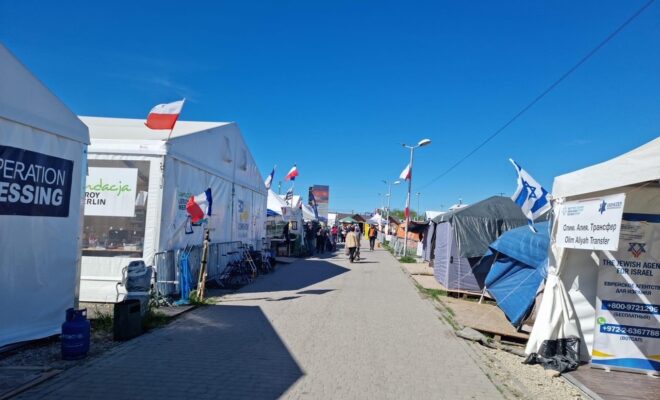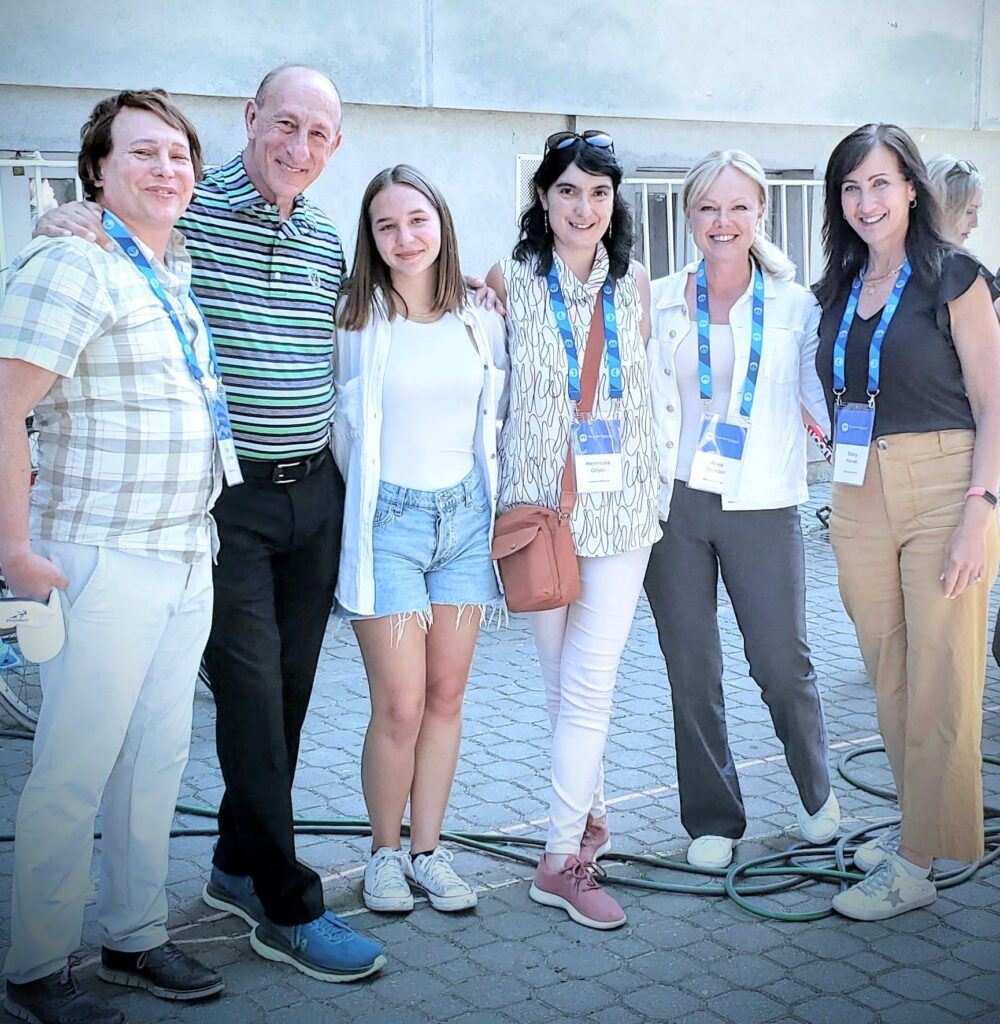
Feature
Finding Refuge: JFED’s Ukraine Refugee Assistance Program
By Christy Pessemier | December 2022
When Russia invaded Ukraine last February, the Jewish Federation of Sarasota-Manatee was one of the organizations that mobilized immediately, both locally and overseas. They had the support of Jewish Federations and Jewish organizations across the United States who all came together to help Ukrainian refugees. As long as this war continues, so will this effort.
According to Shep Englander, CEO of the JFED SRQ, approximately 90% of the population in Ukraine is not Jewish, but that does not change their mission or the priority placed on assisting refugees.
“The Jewish population has been dramatically reduced in Ukraine from what it has been, especially before World War II,” Englander said. “But we had the ability to help. So we decided to make it a priority to help whoever needed it.”
Millions of dollars in matching grants are being provided by the Jewish Federations of North America to equip federations across the country in assisting with the resettlement of Ukrainian families in the U.S. This same model was followed earlier this year, in partnership with the Shapiro Foundation, to help resettle Afghan refugees.
According to JewishFederations.org, 180,000 Ukrainian refugees are expected to resettle in the United States. Englander points out that this number would be much higher if it weren’t for one key factor.
“Men between the ages of 18 to 60 years of age are not allowed to leave the country,” he said. “So normally we would be doing a lot of resettlement, but we can’t resettle whole families because the fathers are not allowed to leave. The rest of the family is staying close by because they don’t want to be split up.”
As a result, Englander himself, along with Board President Bruce Udell, some other board members, and CFO Vickie Tiutyama have gone to the Ukrainian border and to countries where the refugees are fleeing to safety and helping directly to “care for them in place.”

In July, Englander and Udell, along with other board members, visited Poland where the bulk of Ukrainians had fled for shelter and safety. They were able to meet some of the refugees, provide necessary supplies, and bring back eyewitness accounts of the need and impact.
Before Englander had visited, though, Tiutyama had already been to the border twice. Tiutyama is Ukrainian and speaks Ukrainian and Russian. According to Englander, having her help was invaluable.
“We are so fortunate that one of our members of senior management was able to provide support and translation assistance in her own native language.”
Though Tiutyama isn’t Jewish, she has always been closely tied to the Jewish community, and was eager to assist in aiding the refugees.
“Vickie understands the Jewish mission and also happens to be Ukrainian. So there are all these levels where you have goodwill happening across different lines.”
The first time Tiutyama went to Ukraine was to help refugees resettling in Israel. The second time was to the Jewish Community Center site, helping Ukrainians displaced at the border with camps for kids, schools and programs to help refugees in Poland, Hungary, and other countries.
Tiutyama’s family members have been directly impacted by the war. When the news first broke in the US, her family in Ukraine was sleeping and unaware of what was really going on. She called them and convinced them to flee the country.
“I woke them up and told them they needed to evacuate their apartment,” she said. “I was the first one to tell them.”
Her nephew and his wife, cousins, and aunt and uncle all evacuated, but some family members have since come back to Ukraine after trying to live in other countries.“It’s hard when you grow up in one country to start all over again,” she said.
Aside from all the inconveniences, Tiutyama points out that resettling is even more challenging to accomplish without financial help. “That’s where the Jewish Federations come in,” she added.
Tiutyama’s father and daughter have also been involved in volunteering. Her daughter, a college student at UF, had only planned to visit one time to help. She’s now been twice, once to Poland, and another time to Hungary—spending two months of combined time in both countries. And she’s currently still involved, tutoring Ukrainian children for the New York Hebrew School.
After visiting in person, Tiutyama understands the power of seeing the immense amount of need herself.
“It’s something you cannot be prepared for,” she said. “When you hear the stories on TV, that’s one thing, but when you stand there face to face, talking to people and looking in their eyes, it’s a totally different experience.
Englander agrees, and feels a strong sense of meaning and gratitude after his visit to Poland.
“My grandmother came from what is now Ukraine,” he said. “And her whole family was murdered during the Holocaust, not just by Nazis, but by the Ukrainians who joined in and helped the Nazis.”
Though Englander was initially struggling with this reality, he met with the Chief Rabbi of Poland who told Englander and the Sarasota JFED board members, along with other Jewish organization volunteers: “We can’t say, ‘well they didn’t help us, so we’re not going to help them.’ That’s not the Jewish way. The Jewish way is to model what they should have done.”
From that point, Englander felt very proud that they were there providing lifesaving help universally to anyone who needed it.
While in Poland, he visited a home for refugees that was sheltering 22 pregnant women and women with children under two years old who were separated from their husbands because of the war. Englander said he and the other members spoke with them in order to understand their needs so they could explain to people at home in the U.S. what they were going through.
Just as they were leaving, a one-and-a-half year old boy who had been playing in the yard ran up to Englander, his arms outstretched, asking to be picked up. Englander, having raised three children himself, picked the toddler up and spun him around. The boy then ran to Udell, who also picked him up.
“We had two board members who were with us that were women and they were standing there watching him run back and forth between Bruce and me,” Englander said. “And I said ‘I wonder why he’s only running to us?’ Then someone from the organization said ‘because he hasn’t seen his father in six months.’ ”
It’s stories like these that remind Englander and JFED members why they are involved.
“Our goal is to help as many people as possible,” he said. “As Jews, we know too well what it’s like to leave in the middle of the night and arrive in some foreign place so we can keep our family safe.”
As of September 2022, 73.5 million has been raised, with $61 million already distributed to Federations’ core partners, the Jewish Agency for Israel, The American Jewish Joint Distribution Committee (JDC), and World ORT (Jewish Educational Network), along with over 50 other NGOs.
Right now, Jewish Federations are projecting an additional $46 million in need among partner organizations before the end of 2022.
In the past six months, the Jewish organizations’ emergency campaign has had a major impact, with these contributions so far:
- 1,212 tons (just over 2.7 million pounds) of medical equipment, clothing, food and hygiene products distributed
- 239,851 refugees have been fed
- Evacuation of 80,817 people away from danger zones
- 399,902 calls for assistance responded to via special hotlines
- More than 34,000 olim people (Jewish immigrants to Israel) have been welcomed to Israel
- Over 450 volunteers have been engaged by the Jewish Agency to help refugees in six transit centers in countries bordering Ukraine
- With the help of JFNA (Jewish Federations of North America) volunteers, more than 37,000 refugees received assistance from JFNA’s partners in Poland and Hungary between March and June 2022
If you’d like to help, JFED is in need of people who are native Russian and Ukrainian speakers willing to volunteer. Contributions are also welcome, and 100% of donations go to Ukrainian refugee relief. For more information, go to JFEDSRQ.org.




You must be logged in to post a comment Login